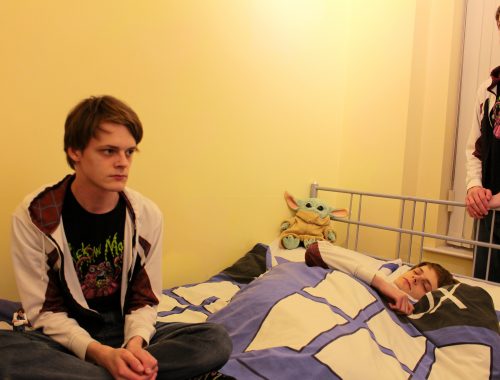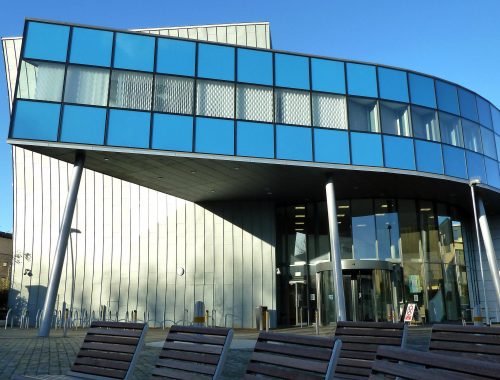Good Things Happen outside of your Comfort Zone: My Experience of Finding and Securing a Work Placement
Covering the events of finding a placement to being halfway through it now, this blog will use the Gibbs reflective cycle to examine and reflect on my experience, my thoughts and feelings and a consideration of what I could have done differently.

Finding Placement and why I chose it
In all honesty I found it quite hard to think of what I wanted to do for placement. I was brought back to the age old question of ‘what do you want to do when you leave university‘. Such a question which for many of us can create more questions than it does answers.
Feeling a bit lost, I thought back to school times when I was doing work experience for a levels and some of the processes I went through there in terms of selecting a placement. At that time I opted for working with a library, and I am still quite interested in that area of work so from there I went about researching some libraries. I contacted a number of libraries and those that got back to me unfortunately could not take me on due to covid procedures. This was definitely something that I had worried about and now I was left a bit in limbo in terms of where to go next. Looking back on this now, I definitely would have tried to step outside of my comfort zone more in order to gain wider opportunities.
Another piece of this puzzle was the fact that I knew I did not want to travel much for this placement. My disability really flared up this year and led me to leave my part time job at the time, so I knew I may be slightly limited in the placements I could choose. Essentially what I was doing here is what Jasper describes as ‘Reflection in action’, “the way that people think and theorize about practice whilst they are doing it”. Before I had chosen a placement, I was already reflecting on what experiences would benefit me.
As we approached the deadline for choosing placement, I was a bit worried, but I remained optimistic that the right opportunity would find me- and thus it did. We had been receiving emails about placement opportunities and one caught my eye. The placement was as a content writer for a place called profile tree. Creative writing is something that I have engaged with a lot in the last few years but I had not been able to find a placement that involved writing. While content writing is not necessarily the most common placement, Stewarts writing here sums up why it can be important to branch out, “New and emerging forms of ‘non-standard’ employment are coming to dominate young people’s early labour-market experiences”.
After the initial process of giving them my CV, I found out that the placement was virtual and that I could do everything from home. So not only was I able to do something that I am so passionate about but I was also able to do so in a way that would not mean I had to sacrifice my wellbeing by pushing myself to do an in person placement.
How I’m getting on now
I’m now about halfway through my placement hours as we approach the Christmas period. So, did it live up to all my expectations? To answer simply, yes. In terms of the writing aspect, I felt a bit out of depth initially but I think this was to my benefit. Essentially, I write blog style articles aimed at helping companies to grow their audiences and to further their marketing skills. In the past I have written articles and had some writing published, but I had never written them in this particular style. I was given access to a creative writing course which gave me some good guidance and beyond that I was quite free to take my own approach to things.
Garrands writing on this helped me to feel a bit more at ease when he talked about how when you take on a writing job it is just as important to have a background in creative writing than anything else, as my own background when starting this placement was in creative writing.
Would I do anything differently?
Looking back on my experience, it is always helpful to reflect and think about whether I would have changed anything if I were to do this again, or something similar when looking for work beyond this module.
My experience of the class content and interacting with others on the module gave me a number of useful perspectives on the situation. In class we discussed the process of finding a placement and what we could do better, which allowed me to voice a lot of the things that I was feeling and reflect on what I would change.
One of the main things that this module allowed me to learn was not to limit yourself and to step outside of your comfort zone. From the perspective of studying English I think its very important to recognise and challenge the stereotype that English students all go into similar professions, like being teachers for example. This module really enlightened me to the fact that an English degree can take you in so many different paths.
So, what I would do when looking for a position further down the line is to be open minded. I would use my transferrable skills to my advantage and not limit myself when it comes to career choices. Boud makes an interesting point on this topic which further sums up why we need to not only reflect but use our reflection to change our actions, “Reflection is not a purely internal psychological process: it is action orientated and historically embedded.”
Furthermore, Another thing I would have done differently would be to start the research process earlier. I think the fact that I secured my placement quite close to the deadline is reflective of this. McMillan’s writing on this supports this idea, “Exploring possible career routes at an early stage will provide you with a better idea of the range of options you should be considering”.
From being rejected from placements to finding one that perfectly suited me, I think this experience shows that good things happen when you step outside of your comfort zone.
Bibliography
- Jasper, Melanie, Beginning Reflective Practice Second Edition, Cengage Learning 2013
- Reflection : Turning Experience into Learning, edited by David Boud, et al., Taylor & Francis Group, 1985. ProQuest Ebook Central, https://ebookcentral-proquest-com.queens.ezp1.qub.ac.uk/lib/qub/detail.action?docID=1461054.
- How to Improve your Critical Thinking & Reflective Skills, Pearson Education UK, 2013. ProQuest Ebook Central, https://ebookcentral-proquest-com.queens.ezp1.qub.ac.uk/lib/qub/detail.action?docID=5248200.
- Stewart, A. et al. (2021) Internships, Employability and the Search for Decent Work Experience. Cheltenham, UK: Edward Elgar Publishing (The ILO Future of Work Ser). Available at: https://search-ebscohost-com.queens.ezp1.qub.ac.uk/login.aspx?direct=true&db=edsebk&AN=2955127&site=eds-live&scope=site (Accessed: 3 December 2021).
- Garrand, Timothy Paul, Writing for multimedia and the Web: a practical guide to content development for interactive media, Focal Press 2006
Summer Stressin', Havin' a Blast
You May Also Like

AAAH or (Why Tom sucks at selling himself)
25 November 2021
Roles Reversed
26 November 2021
